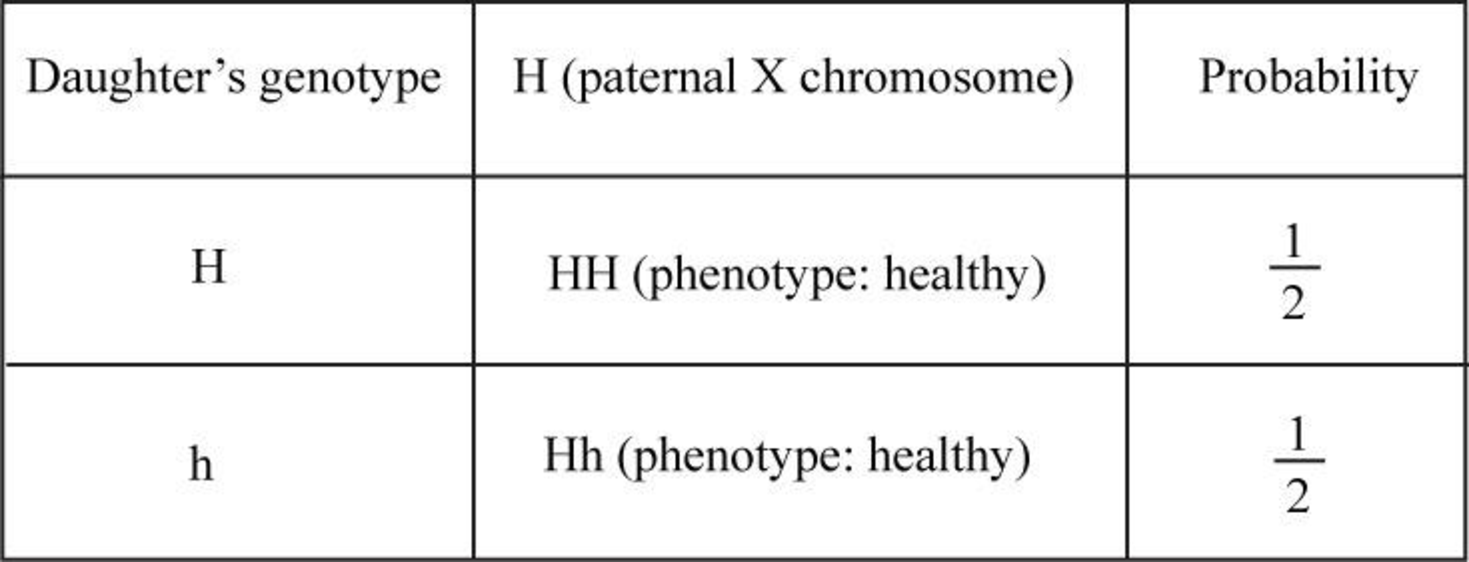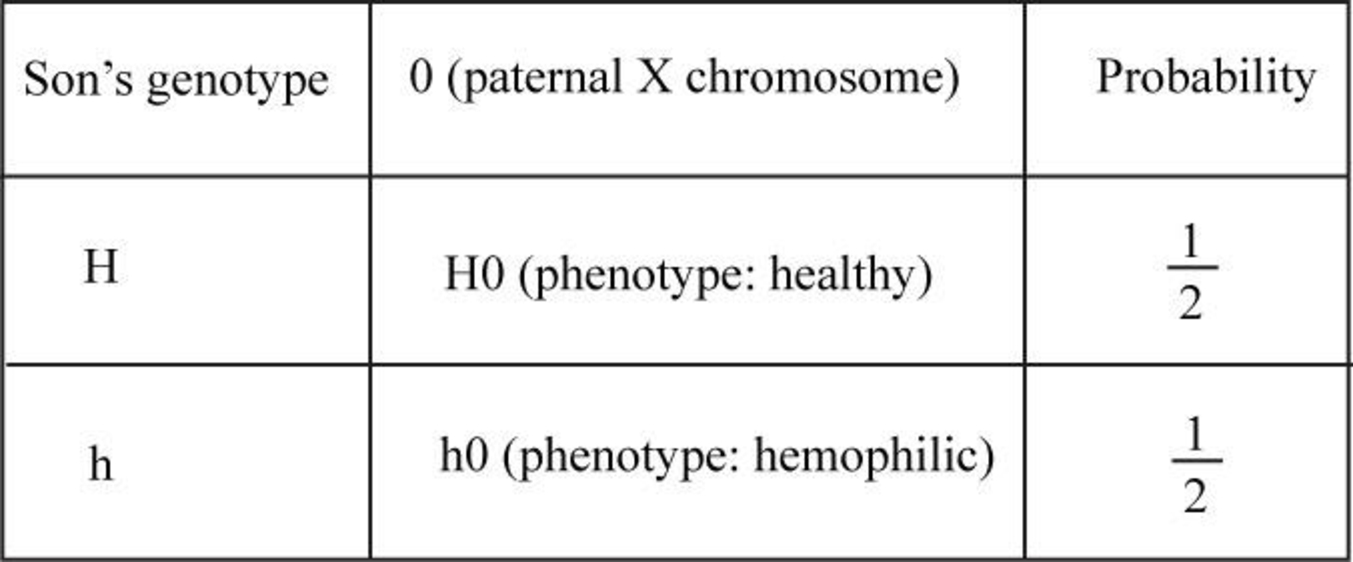
Concept explainers
A man with hemophilia (a recessive, sex-linked condition) has a daughter without the condition, who marries a man who does not have hemophilia. What is the probability that their daughter will have the condition? Their son? If they have four sons, that all will be affected?
To determine:
The probability that son will have the hemophilia condition, when a man with hemophilia (a recessive, sex-linked condition) has a daughter without hemophilia who marries a man who does not have hemophilia. Determine whether all the four sons will be affected or not.
Introduction:
Hemophilia is a sex-linked disorder, which impairs the blood-clotting mechanism in the affected individuals. Those individuals who receive the non-functional gene from their parents must have X-chromosome linked to recessive trait.
Explanation of Solution
Consider the genotypes of daughter as H and h. As the male suffers from the hemophilic condition, the disorder is linked with the male chromosomes XY. The disorder is recessive and sex-linked. Here, the male chromosomes are considered as Hh. The probability that the daughter will be hemophilic is zero.

The female has one wild type allele (H) and one recessive mutant allele (h). The male has only wild-type allele and a Y chromosome. If the disorder is not linked with Y chromosome, then it is considered to be 0. The males received only one X chromosome, and hence, they have higher chances of carrying this disorder.

The sons have 50% chances of being affected by hemophilia. There is ½ probability that the sons are affected by the hemophilic condition.
Here, the Y chromosome does not contain hemophilia. Therefore, the hemophilic conditions are more dominant in sons.
As each son has a 50% chance of being affected by hemophilia, the probability of four sons is calculated as follows:
Here, the probability of all the sons who are affected is
The man with hemophilia and his daughter and son in law without this disease and the probability of acquiring this disease in his granddaughter is about 0. If he has a grandson, then it would be of ½ probability and in case if he has 4 grandsons, then it would be of 1/16 probability.
Want to see more full solutions like this?
Chapter 12 Solutions
EP CAMPBELL BIO.FOCUS-MOD.MASTER.(18WK)
Additional Science Textbook Solutions
Biological Science (6th Edition)
Biology: Life on Earth with Physiology (11th Edition)
Chemistry: A Molecular Approach (4th Edition)
Physics of Everyday Phenomena
HUMAN ANATOMY
Campbell Essential Biology (7th Edition)
- What is this?arrow_forwardMolecular Biology A-C components of the question are corresponding to attached image labeled 1. D component of the question is corresponding to attached image labeled 2. For a eukaryotic mRNA, the sequences is as follows where AUGrepresents the start codon, the yellow is the Kozak sequence and (XXX) just represents any codonfor an amino acid (no stop codons here). G-cap and polyA tail are not shown A. How long is the peptide produced?B. What is the function (a sentence) of the UAA highlighted in blue?C. If the sequence highlighted in blue were changed from UAA to UAG, how would that affecttranslation? D. (1) The sequence highlighted in yellow above is moved to a new position indicated below. Howwould that affect translation? (2) How long would be the protein produced from this new mRNA? Thank youarrow_forwardMolecular Biology Question Explain why the cell doesn’t need 61 tRNAs (one for each codon). Please help. Thank youarrow_forward
- Molecular Biology You discover a disease causing mutation (indicated by the arrow) that alters splicing of its mRNA. This mutation (a base substitution in the splicing sequence) eliminates a 3’ splice site resulting in the inclusion of the second intron (I2) in the final mRNA. We are going to pretend that this intron is short having only 15 nucleotides (most introns are much longer so this is just to make things simple) with the following sequence shown below in bold. The ( ) indicate the reading frames in the exons; the included intron 2 sequences are in bold. A. Would you expected this change to be harmful? ExplainB. If you were to do gene therapy to fix this problem, briefly explain what type of gene therapy youwould use to correct this. Please help. Thank youarrow_forwardMolecular Biology Question Please help. Thank you Explain what is meant by the term “defective virus.” Explain how a defective virus is able to replicate.arrow_forwardMolecular Biology Explain why changing the codon GGG to GGA should not be harmful. Please help . Thank youarrow_forward
- Stage Percent Time in Hours Interphase .60 14.4 Prophase .20 4.8 Metaphase .10 2.4 Anaphase .06 1.44 Telophase .03 .72 Cytukinesis .01 .24 Can you summarize the results in the chart and explain which phases are faster and why the slower ones are slow?arrow_forwardCan you circle a cell in the different stages of mitosis? 1.prophase 2.metaphase 3.anaphase 4.telophase 5.cytokinesisarrow_forwardWhich microbe does not live part of its lifecycle outside humans? A. Toxoplasma gondii B. Cytomegalovirus C. Francisella tularensis D. Plasmodium falciparum explain your answer thoroughly.arrow_forward
- Select all of the following that the ablation (knockout) or ectopoic expression (gain of function) of Hox can contribute to. Another set of wings in the fruit fly, duplication of fingernails, ectopic ears in mice, excess feathers in duck/quail chimeras, and homeosis of segment 2 to jaw in Hox2a mutantsarrow_forwardSelect all of the following that changes in the MC1R gene can lead to: Changes in spots/stripes in lizards, changes in coat coloration in mice, ectopic ear formation in Siberian hamsters, and red hair in humansarrow_forwardPleiotropic genes are genes that (blank) Cause a swapping of organs/structures, are the result of duplicated sets of chromosomes, never produce protein products, and have more than one purpose/functionarrow_forward
 Human Biology (MindTap Course List)BiologyISBN:9781305112100Author:Cecie Starr, Beverly McMillanPublisher:Cengage Learning
Human Biology (MindTap Course List)BiologyISBN:9781305112100Author:Cecie Starr, Beverly McMillanPublisher:Cengage Learning Human Heredity: Principles and Issues (MindTap Co...BiologyISBN:9781305251052Author:Michael CummingsPublisher:Cengage Learning
Human Heredity: Principles and Issues (MindTap Co...BiologyISBN:9781305251052Author:Michael CummingsPublisher:Cengage Learning
 Concepts of BiologyBiologyISBN:9781938168116Author:Samantha Fowler, Rebecca Roush, James WisePublisher:OpenStax College
Concepts of BiologyBiologyISBN:9781938168116Author:Samantha Fowler, Rebecca Roush, James WisePublisher:OpenStax College Biology (MindTap Course List)BiologyISBN:9781337392938Author:Eldra Solomon, Charles Martin, Diana W. Martin, Linda R. BergPublisher:Cengage Learning
Biology (MindTap Course List)BiologyISBN:9781337392938Author:Eldra Solomon, Charles Martin, Diana W. Martin, Linda R. BergPublisher:Cengage Learning Biology Today and Tomorrow without Physiology (Mi...BiologyISBN:9781305117396Author:Cecie Starr, Christine Evers, Lisa StarrPublisher:Cengage Learning
Biology Today and Tomorrow without Physiology (Mi...BiologyISBN:9781305117396Author:Cecie Starr, Christine Evers, Lisa StarrPublisher:Cengage Learning





